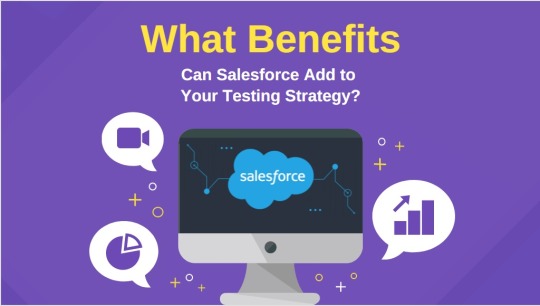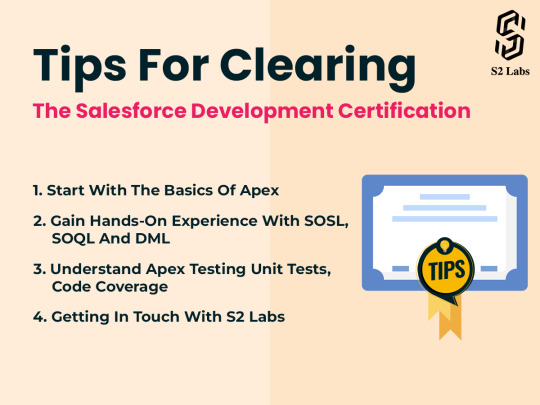#salesforcetest
Explore tagged Tumblr posts
Text
Salesforce Testing: Everything you should know in 2025

Explore Salesforce Testing: Everything You Should Know in 2025 — your complete guide to testing Salesforce apps and integrations. Learn about automation tools, testing strategies, best practices, and upcoming trends that ensure smooth, error-free CRM performance in the evolving Salesforce ecosystem.
0 notes
Text
There are some lesser-known apps and features that can help streamline your work and maximize your salesforce efficiency even further. Here are five of them.
#ethics first#habilelabs#crmsoftware#salesforcetesting#salesforce developer#salesforce services#salesforce#salesprocess
0 notes
Text
Salesforce Automation Testing: Why Partner with an Independent Software Testing Company?
Salesforce, a leading cloud-based CRM platform, has become the backbone of many businesses. Its complexity, coupled with frequent updates, makes testing a critical aspect of ensuring its optimal performance and user experience. While in-house teams can handle testing, partnering with an independent software testing company offers several advantages.
#SalesforceTesting#TestingServices#SalesforceQA#QualityAssurance#TestAutomation#SoftwareTesting#BugFree#DefectFree#SeamlessIntegration#SalesforceExperts#TestingSolutions#EndToEndTesting#AutomatedTesting#FunctionalTesting#PerformanceTesting#QAEngineering#TestingExperts#ReliableTesting#FlawlessFunctionality#MaximizedEfficiency#SalesforcePerformance#TestingTools#QAProcess#ThoroughTesting#TestingStrategies#CustomTesting#SalesforceOptimization#ErrorFreeSalesforce#TestingConsultants#SalesforceSuccess
1 note
·
View note
Text
Accelerate and Innovate Salesforce with Continuous Test Automation
Salesforce environments move at a different pace. Your systems are constantly bombarded with change in the form of release cycles, in-sprint updates, refreshes, critical integration and ongoing project innovation. In the midst of all this change, there is no denying the fact that Continuous testing is essential to achieve these dynamic needs.
In this blog, we’ll discuss major hurdles in implementing continuous testing for Salesforce. We’ll also discuss how to overcome these challenges to achieve continuous innovation.
Why you need to implement Continuous Testing for Salesforce?
Introduce and expand test automation – Continuous testing is all about testing early, often, and comprehensively to get quick feedback. So, enterprises that want to implement continuous testing for Salesforce need to introduce test automation to achieve this. To get faster feedback on whether latest changes have broken any critical business processes, automation is necessary. However, getting started with test automation in case of Salesforce is quite difficult because of complex architecture (dynamic elements, frames).
Release Readiness – One of the major goal of “Continuous Testing” is to determine whether or not release candidate is ready for production. Salesforce delivers hundreds of innovative features in the form of seasonal releases i.e. Spring, Summer, and Winter. IT managers cannot make go/no-go release decision a guessing game because a bad release can cost you revenue and reputation. Prior to deployment in the production, IT managers need to understand the impact of new features on existing business processes and critical configurations.
End-to-End Integrations – Salesforce can be integrated seamlessly with numerous third-party applications. In a scenario when various packaged apps work behind the scenes, it is recommended to test all the micro-services, APIs, and other integrated platforms during different cadences to ensure that user experience and business processes have not been impacted with new functionality.
Focus on the right continuous test automation approach to address these challenges
You cannot expect success by allowing manual testers to download some open-source test automation tool to automate processes across Salesforce. To succeed, your continuous testing approach should be built around change. You need to determine how changes have impacted your existing business processes and configurations. In fact, you need to bring in a continuous testing process that supports quality, speed, and efficiency. And, this can only be achieved with right test automation tool.
Our proposed solution: OpKey
We propose “OpKey”, a Continuous test automation platform for Salesforce. OpKey gives real-time visibility into changes to QA teams that comes with a release. OpKey’s AI-powered change impact assessment engine performs a comparative analysis of the old and updated instance to highlight changes across the configurations, transactions and custom screens while predictive intelligence recommends test cases based on the impacted areas. By highlighting risks, OpKey allows testing teams to refactor test cases while enabling IT managers to plan release better. OpKey’s prebuilt test libraries for Sales, Marketing, Service Cloud, & CPQ help QA teams to cut down initial set up time by 70% while AI-powered self-healing capabilities make test maintenance effortless.
OpKey is the only test automation platform that offer support for support for web, mobile, APIs, Desktop, Citrix, Mainframes and other legacy applications. OpKey allows SFDC test automation along with enabling end-to-end test automation across multiple ERPs/ packaged apps. Integrated change analysis, risk assessment and automation capabilities of OpKey will help enterprises to seamlessly implement continuous test automation for their Salesforce instance.
Contact us today and ensures your business processes run smoothly, regardless of change with OpKey’s Continuous Salesforce test automation platform.
Read the original article here : Accelerate and Innovate Salesforce with Continuous Test Automation
0 notes
Text
What Benefits Can Salesforce Add to Your Testing Strategy?

What Benefits Can Salesforce Add to Your Testing Strategy?
Salesforce is used widely today for customer management and marketing purposes. Each deployment is different due to customization options and this is what makes testing so essential. There are many ways to test Salesforce and automated Salesforce testing makes the overall testing process speedier. You need to test for security weaknesses, do load and stress testing, test that you can deploy new Salesforce code efficiently and much more. User acceptance testing is the final stage before you can release the code to production. With all the types of testing, there are many benefits to your organization. Increase Test Coverage and Reduce Risks Salesforce is the first cloud-based CRM system in the world. Its purpose is to help you to market, sell, service, analyze, and connect with your clients in an affordable and easy way. Many Salesforce features can be customized to suit your company's needs. A challenge of testing is checking the customized code. Salesforce is built on a development language known as APEX, which offers built-in test cases. Developers can do tests such as unit, system, UAT, production, and regression testing. There are two types of testing: manual and automated. Manual testing is testing using traditional methods, whereas automation involves using a platform like Selenium to automate the testing process. For large businesses, manual testing is just not feasible and they need Salesforce test automation if they want to improve the speed and quality of their testing. Compared to Salesforce, manual testing which is a time-consuming process and is very costly, Salesforce automation testing reduces the time and possible errors which can occur when testing manually. Build the Most Reliable Software Deployments Salesforce testing helps to ensure that you build the most reliable software deployments possible. You can verify that processes perform as intended within Salesforce and between Salesforce and other applications and systems. With automation, it is possible to run more tests in a shorter time and this enhances the value of Salesforce to your business. Traditionally, deployments were time-consuming and prone to errors as teams had to rely on manual tools. Automation has allowed developers to boost their deployment success rates quite dramatically. With increased test coverage, developers can efficiently run test cases that need repeated execution, check the functionality of various time-based events and verify that business requirements are being met. Identify Problems or Failures Early with Salesforce Testing By combining various different tests, developers can identify failures or problems early on in the development process. By testing early and often, they can catch problems while they are still easy to rectify. Far fewer bugs or errors are found in releases due to continual testing early in the development process. By identifying problems early on and fixing them, it means being able to deploy new work at any time without causing critical issues in production or breaking existing functionality. Deployment is more robust and causes fewer future risks. This also means shorter turnaround times which can save you money and free up resources for work on other important projects. Reduce the Risk of Data Leaks One of the major advantages of using Salesforce is the quality and quantity of information it retrieves. You can look at every individual account, task, event, contact and opportunity tied to a lead before approaching prospective customers. The downside is that Salesforce deployment stores a great deal of sensitive information. The very fact that it is so flexible and customizable can make it open to attack. Writing custom code, changing configurations or adding integrations can make it vulnerable. Authorization bypass, SOQL injection and stored cross-site scripting are common risks to data when using Salesforce. A data leak could be very damaging to your business and destroy your reputation. This is why proper testing is so important. With proper testing that picks up vulnerabilities, you are less likely to suffer a data breach. Improve Customer Experience with Salesforce Test Results Businesses today compete on the basis of customer experience, which means you need robust business processes to enable your sales and marketing efforts. Salesforce offers the practices, systems and technologies you need to manage customer communication and data. It can help you ensure customers have the best possible experience when interacting with your business. Deploying Salesforce and testing it within the business ecosystem is critical if you want to improve customer experience. Only with robust testing can you ensure that you are deploying Salesforce in the most effective way to improve it so you can retain customers for sustained business growth. Help Developers Identify Areas for Improvement Developers involved from the beginning in testing can quickly learn the ins and outs of Salesforce and identify areas for improvement from test results. This can result in better custom features and integrations to help connect all the applications you use for your business into Salesforce. With better integrations, your overall productivity improves. Validating and testing custom code in advance of release ensures its quality and means less time goes for resolving bugs and critical errors. Early involvement of developers means they know what to expect when the next update rolls out. And they can pick up bugs and issues more easily, especially on custom app builds. Then, they can easily switch between work streams and incorporate feedback from stakeholders, pursuing an iterative strategy that offers continual improvements for end-users. Read the full article
0 notes
Link
Salesforce Technologies is one of the leading and very trending technology in the IT industry. Through Salesforce Technology thousands of Job opportunities are created for Salesforce developers and Salesforce Administration Job Seekers. As per Forbes magazine, nearly 55% of enterprises predict cloud computing will enable a new business model in three years. So Salesforce is one of the Cloud Computing Technologies which have a bright future in the upcoming years. Salesforce provides different enterprise cloud computing applications to all-size industries and businesses.
0 notes
Text

Let's take your Technical And Analytical skills to new heights together!
Buy our Premium Salesforce Development course now
Click here: https://shreysharma.com/salesforce-developer-tutorials/
#s2labs#salesforce#certification#salesforcetraining#salesforcetrainingindia#training#salesforcedevelopment#salesforcecertificate#salesforcedatamodeling#salesforcedatasecurity#salesforcapex#salesforcetesting#salesforcebasics#salesforcedevelopercertification
0 notes
Text
How to solve the 3 biggest Oracle Cloud testing challenges with “Risk-based” Continuous Testing?

Enterprises across the globe using Oracle Cloud Applications often face similar challenges while testing their applications. Their key questions remain the same.
How can they work out what to test?
How can they understand the changes that come with frequent updates?
How to maintain test automation scripts?
Finding suitable answers to the above questions is important to keep business disruption at bay. Enterprises that struggle to find answers to these questions often leave the business at risk. In this blog, we’ll discuss how “risk-based” continuous testing can help in addressing these challenges.
What to test?
Oracle cloud apps are ever-evolving that receives updates thrice a year. These updates bring new functionalities, features, & bug fixes that help enterprises to efficiently and effectively manage their operations. Since these updates have the potential to negatively impact the existing business processes, enterprises need to regressively test the updates prior to deployment to the production. Oracle offers a two-week window for testing. However, the biggest challenge is “What to test?” Oracle cloud apps are huge, can be customized and integrated with a range of applications. QA teams often find themselves in a dilemma while deciding what to test and how many regression cycles they need to run.
How to understand changes that come with frequent updates?
Updates every quarter means that every three months enterprises will receive new functionality. Anyone responsible for managing and supporting Oracle Cloud Apps needs to understand how new features are going to impact current business processes. Since new features could have major implications for operational efficiency, even small changes need to be tested.
How to maintain test scripts?
QA teams often struggle to maintain the test scripts. Oracle Cloud Apps feature dynamic elements. Updates in Oracle Cloud Apps often bring navigation changes, change in the object metadata and properties, and changes in the table structures. Due to these changes, test scripts tend to break, leading to unstable test results.
Risk-based Continuous Testing – Helping you keep pace with Oracle Cloud Frequent Updates
How to decide which test cases are important is a daunting task. Whatever testers consider may not be necessarily important. Our vast industry experience suggests that QA teams often go for a “test everything” approach. However, they tend to achieve only 40% of the risk coverage. On average, 70% of the test cases don’t contribute towards test coverage. Rather they make testing slow to execute and costly to maintain. We recommend the “Risk-based Testing” approach that focuses on risk coverage. AI-powered risk-based testing helps QA teams to focus on test cases aligned with business priority. With this, QA teams can quickly reach optimal coverage with focused continuous test automation. With continuous testing, QA teams can test early, often & comprehensively using an automation framework, enabling IT managers to make informed decisions on the optimization of the value of a release.
The proposed Oracle Cloud Test Automation Framework should support
Change Impact Maturity – Always select an Oracle aware automated test framework that highlights the changes in your transactions, configurations, and custom screens after the update and immediately identifies the testing impacts due to those changes.
Risk-based Test Recommendations – The selected test automation framework should take away all the guesswork out of determining what needs to be tested before changes are deployed to your Oracle Cloud apps. The test automation framework should recommend test cases based on the highlighted risk and their dependent components to eliminate hours of effort and struggle.
Autonomous Healing of Test Scripts – Oracle Cloud test automation framework should alleviate the “maintenance burden” that undermines the test automation initiatives. The test automation framework should come with autonomous healing capabilities so that changes can be accommodated automatically without requiring human efforts. It will save hours of manual effort.
Summing Up
Thus, with the help of Risk-based Continuous Testing, enterprises can easily achieve adequate test coverage while minimizing execution time and efforts. Understanding the impact of the changes help your enterprise update adoption ready while risk-based coverage keeps business risks at bay.
0 notes
Photo

✍️Enroll Now: https://bit.ly/3EQ6x9e 👉Attend Attend FREE Online workshop on User Management on Salesforce By Real-Time Expert | Sriman IT 📅Start Date: 28th September @ 10:00 AM IST For More Details: Call: +91-9985014433 WhatsApp: 9985024433 📩Join us on Telegram : https://t.me/sriman_it ✨ 📩Subscribe Our YouTube Channel : https://www.youtube.com/channel/UC26qAebkJyZ-e7k26refLVA 📩Join us on Facebook : https://www.facebook.com/SrimaniTech/ 📩Join us on Instagram : https://www.instagram.com/sriman_it/ 📩 Join us on Twitter : https://twitter.com/sriman_it 💥Features of Online Training ✅ Real-Time Oriented Training ✅ Live Training Sessions ✅ Interview Preparation Tips ✅ FAQ’s #salesforcelogin #salesforce #salesforcetrailhead #salesforceshareprice #salesforcedeveloper #whatissalesforce #salesforcecareers #salesforcecertification #workbenchsalesforce #salesforcecom #loginsalesforcecom #salessalesforce #salesforcecomlogin #salesforcelogin #salesforcedeveloperlogin #whatissalesforceappexchange #salesforceprmpricing #salesforceprm #salesforceshareprice #salesforcetesting #salesforcedeveloper #developer #programmer #salesforceworkbench #workbench ##salesforceisanexampleofcloudservicemodel #vlocitysalesfoce #salesforcecareershyderabad #salesforcetraininginhyderabad (at Hyderabad) https://www.instagram.com/p/CUWS8ikpe53/?utm_medium=tumblr
#salesforcelogin#salesforce#salesforcetrailhead#salesforceshareprice#salesforcedeveloper#whatissalesforce#salesforcecareers#salesforcecertification#workbenchsalesforce#salesforcecom#loginsalesforcecom#salessalesforce#salesforcecomlogin#salesforcedeveloperlogin#whatissalesforceappexchange#salesforceprmpricing#salesforceprm#salesforcetesting#developer#programmer#salesforceworkbench#workbench#salesforceisanexampleofcloudservicemodel#vlocitysalesfoce#salesforcecareershyderabad#salesforcetraininginhyderabad
0 notes
Text
Decorators play vital role in code readability. Dive into detailed process of decorating a method in Lightning Web Components within the Salesforce environment.
#habilelabs#ethicsfirst#crmsoftware#aws cloud#salesforcetesting#salesforce services#salesforce developer
0 notes
Link
Opkey is a Salesforce test automation platform with zero code test builder and test process orchestrator for end to end testing.
#salesforcetestautomation#salesforcetestingtools#salesforcetesting salesforcetest testsalesforce SFDCtesting SFDCtestingtools
1 note
·
View note
Text
Importance of Artificial Intelligence in Salesforce Testing
Salesforce, a leading customer relationship management (CRM) platform, is widely adopted by organizations to manage their sales, marketing, and customer service operations. As Salesforce implementations become more complex and integrated, ensuring the reliability and functionality of these systems through effective testing becomes crucial. Salesforce testing is critical to ensuring the functionality and reliability of Salesforce implementations. However, traditional testing approaches often need help with time, effort, and accuracy.
1 note
·
View note
Text
Empower Your Salesforce Journey: Building Dynamic Filter Rules Effortlessly with Lightning Web Components for Enhanced Opportunity Management.
#salesforcetesting#salesforce services#salesforce developer#salesforce#aws services#crmsoftware#ethics first#habilelabs
0 notes
Text
Do you know about Integration in Salesforce? Learn how connected apps in Salesforce deliver a robust framework for securely integrating external applications.
#salesforce services#salesforcetesting#custom salesforce development#salesforce developer#salesforce#ethicsfirst#habilelabs
0 notes
Text
Salesforce provides different services, including Platform as a Service (PaaS) and Community Cloud. Let's know about Complete guide for Salesforce Testing.
0 notes
Text

Do you want to be a Salesforce Developer?
Here are a few pointers to help you to go through the Salesforce Certification process.
Want to know more about S2 Labs?
Contact here: https://shreysharma.com/salesforce-developer-tutorials/
#s2labs#salesforce#certification#salesforcetraining#salesforcetrainingindia#training#salesforcedevelopment#salesforcecertificate#salesforcedatamodeling#salesforcedatasecurity#salesforcapex#salesforcetesting#salesforcebasics#salesforcedevelopercertification
0 notes